Translation翻译训练
- 格式:pptx
- 大小:62.64 KB
- 文档页数:11
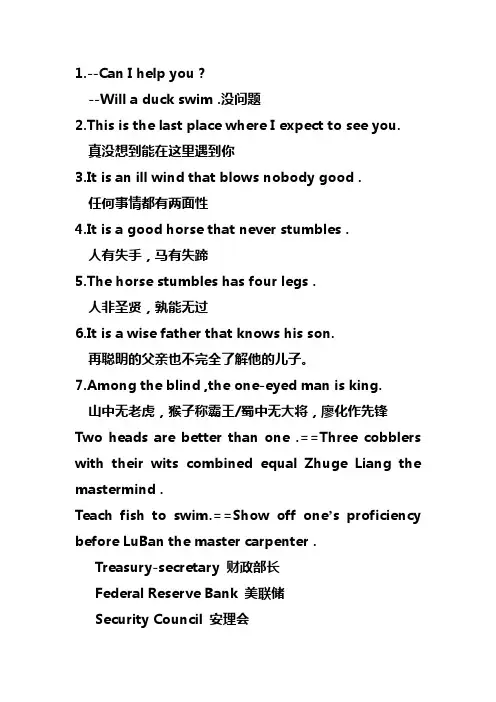
1.--Can I help you ?--Will a duck swim .没问题2.This is the last place where I expect to see you.真没想到能在这里遇到你3.It is an ill wind that blows nobody good .任何事情都有两面性4.It is a good horse that never stumbles .人有失手,马有失蹄5.The horse stumbles has four legs .人非圣贤,孰能无过6.It is a wise father that knows his son.再聪明的父亲也不完全了解他的儿子。
7.Among the blind ,the one-eyed man is king.山中无老虎,猴子称霸王/蜀中无大将,廖化作先锋Two heads are better than one .==Three cobblers with their wits combined equal Zhuge Liang the mastermind . Teach fish to swim.==Show off one’s proficiency before LuBan the master carpenter .Treasury-secretary 财政部长Federal Reserve Bank 美联储Security Council 安理会IMF:International Monetary Fund国际资金货币组织He once again imparted to us his great knowledge ,experience and wisdom.我们又一次领会了他那广博的知识,丰富的经验和无穷的智慧。
A short girl in a flat black straw hat appeared in the open doorway .一个头戴黑色扁平草帽的小姑娘,出现在门口。
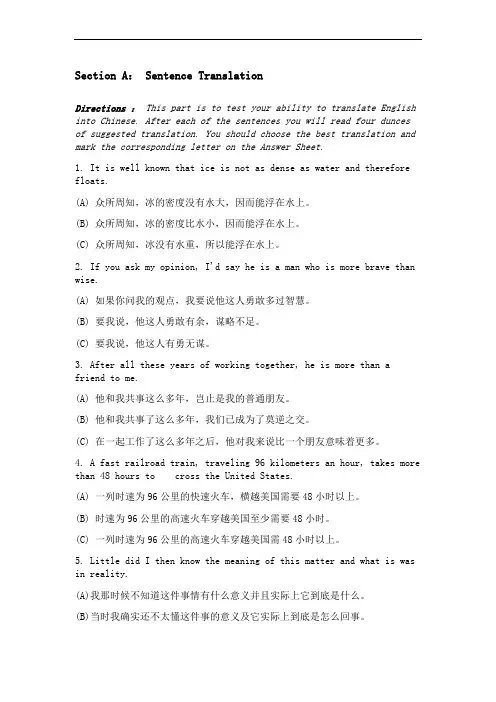
Section A: Sentence TranslationDirections :This part is to test your ability to translate English into Chinese. After each of the sentences you will read four dunces of suggested translation. You should choose the best translation and mark the corresponding letter on the Answer Sheet.1. It is well known that ice is not as dense as water and therefore floats.(A) 众所周知,冰的密度没有水大,因而能浮在水上。
(B) 众所周知,冰的密度比水小,因而能浮在水上。
(C) 众所周知,冰没有水重,所以能浮在水上。
2. If you ask my opinion, I'd say he is a man who is more brave than wise.(A) 如果你问我的观点,我要说他这人勇敢多过智慧。
(B) 要我说,他这人勇敢有余,谋略不足。
(C) 要我说,他这人有勇无谋。
3. After all these years of working together, he is more than afriend to me.(A) 他和我共事这么多年,岂止是我的普通朋友。
(B) 他和我共事了这么多年,我们已成为了莫逆之交。
(C) 在一起工作了这么多年之后,他对我来说比一个朋友意味着更多。
4. A fast railroad train, traveling 96 kilometers an hour, takes more than 48 hours to cross the United States.(A) 一列时速为96公里的快速火车,横越美国需要48小时以上。
![Translation翻译练习[五篇]](https://uimg.taocdn.com/bd2905cd18e8b8f67c1cfad6195f312b3169eb87.webp)
Translation翻译练习[五篇]第一篇:Translation 翻译练习Translation 翻译练习:英译汉一、1.用转译法将下列各句译成汉语。
1)The letter I is commonly used for current.2)The first cooperation of ours is a success.3)The catalogues,samples and prices are shown in the table above.4)A TV set differs from a radio in that it receives pictures.5)The product from a dryer is often ready for final packing.6)This program is not popular with all of the students.2.用增词法将下列各句译成汉语。
1)The first motor cars in this country went into operation in l905.2)There are three chief effects of electric currents:the magnetic, heating and chemical.3)His failure to observe the safety regulations results in an accident to the machinery.4)For many years,there has been serious unemployment in this city.5)The force of expansion makes it necessary to build a bridge in sections.3.省略法将下列各句译成汉语。
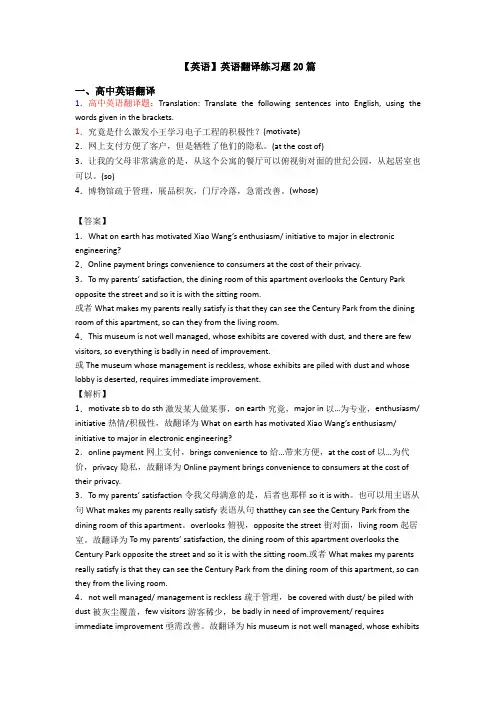
【英语】英语翻译练习题20篇一、高中英语翻译1.高中英语翻译题:Translation: Translate the following sentences into English, using the words given in the brackets.1.究竟是什么激发小王学习电子工程的积极性?(motivate)2.网上支付方便了客户,但是牺牲了他们的隐私。
(at the cost of)3.让我的父母非常满意的是,从这个公寓的餐厅可以俯视街对面的世纪公园,从起居室也可以。
(so)4.博物馆疏于管理,展品积灰,门厅冷落,急需改善。
(whose)【答案】1.What on earth has motivated Xiao Wang’s enthusiasm/ initiative to major in electronic engineering?2.Online payment brings convenience to consumers at the cost of their privacy.3.To my parents’ satisfaction, the di ning room of this apartment overlooks the Century Park opposite the street and so it is with the sitting room.或者What makes my parents really satisfy is that they can see the Century Park from the dining room of this apartment, so can they from the living room.4.This museum is not well managed, whose exhibits are covered with dust, and there are few visitors, so everything is badly in need of improvement.或The museum whose management is reckless, whose exhibits are piled with dust and whose lobby is deserted, requires immediate improvement.【解析】1.motivate sb to do sth 激发某人做某事,on earth究竟,major in 以…为专业,enthusiasm/ initiative热情/积极性,故翻译为What on earth has motivated Xiao Wang’s enthusiasm/ initiative to major in electronic engineering?2.online payment网上支付,brings convenience to给…带来方便,at the cost of以…为代价,privacy隐私,故翻译为Online payment brings convenience to consumers at the cost of their privacy.3.To my parents’ satisfaction令我父母满意的是,后者也那样so it is with。
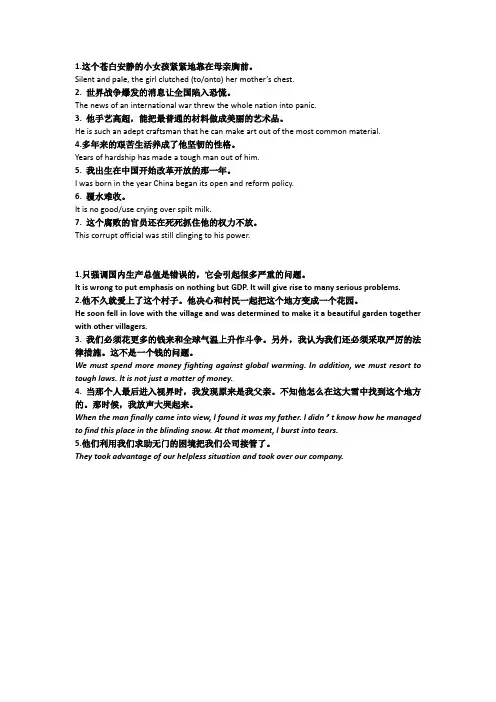
1.这个苍白安静的小女孩紧紧地靠在母亲胸前。
Silent and pale, the girl clutched (to/onto) her mother’s chest.2. 世界战争爆发的消息让全国陷入恐慌。
The news of an international war threw the whole nation into panic.3. 他手艺高超,能把最普通的材料做成美丽的艺术品。
He is such an adept craftsman that he can make art out of the most common material.4.多年来的艰苦生活养成了他坚韧的性格。
Years of hardship has made a tough man out of him.5. 我出生在中国开始改革开放的那一年。
I was born in the year China began its open and reform policy.6. 覆水难收。
It is no good/use crying over spilt milk.7. 这个腐败的官员还在死死抓住他的权力不放。
This corrupt official was still clinging to his power.1.只强调国内生产总值是错误的,它会引起很多严重的问题。
It is wrong to put emphasis on nothing but GDP. It will give rise to many serious problems.2.他不久就爱上了这个村子。
他决心和村民一起把这个地方变成一个花园。
He soon fell in love with the village and was determined to make it a beautiful garden together with other villagers.3. 我们必须花更多的钱来和全球气温上升作斗争。
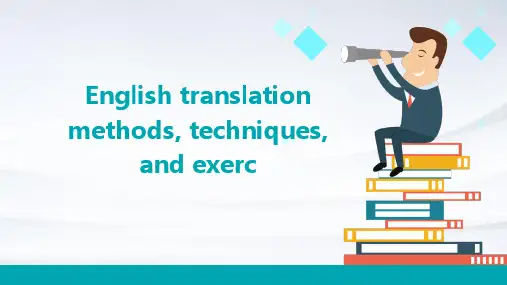

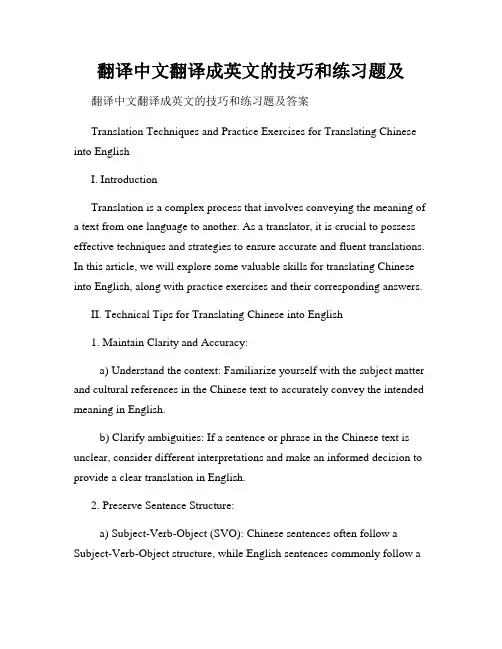
翻译中文翻译成英文的技巧和练习题及翻译中文翻译成英文的技巧和练习题及答案Translation Techniques and Practice Exercises for Translating Chinese into EnglishI. IntroductionTranslation is a complex process that involves conveying the meaning of a text from one language to another. As a translator, it is crucial to possess effective techniques and strategies to ensure accurate and fluent translations. In this article, we will explore some valuable skills for translating Chinese into English, along with practice exercises and their corresponding answers.II. Technical Tips for Translating Chinese into English1. Maintain Clarity and Accuracy:a) Understand the context: Familiarize yourself with the subject matter and cultural references in the Chinese text to accurately convey the intended meaning in English.b) Clarify ambiguities: If a sentence or phrase in the Chinese text is unclear, consider different interpretations and make an informed decision to provide a clear translation in English.2. Preserve Sentence Structure:a) Subject-Verb-Object (SVO): Chinese sentences often follow a Subject-Verb-Object structure, while English sentences commonly follow aSubject-Object-Verb (SOV) structure. Ensure the sentence structure is adjusted accordingly during translation.b) Connectors and transitions: Chinese language utilizes connectors and transitions differently than English. Pay attention to conjunctions, prepositions, and transitional words while maintaining the coherence and fluency of the translated text.3. Be Mindful of Cultural Differences:a) Idioms and proverbs: Understand the cultural meaning behind Chinese idioms and proverbs and strive to find equivalent expressions in English to maintain the intended message.b) Cultural references: Chinese texts often refer to specific events, figures, or traditions. Adapt these cultural references to English equivalents that resonate with English-speaking audiences.4. Use the Correct Register and Tone:a) Formality: Determine the appropriate level of formality in the target text, considering factors such as the genre, audience, and purpose of the translation.b) Tone: Capture the tone of the original Chinese text, whether it is formal, informal, academic, or colloquial, and reflect it appropriately in English.III. Practice ExercisesExercise 1:Translate the following Chinese sentence into English: "我最喜欢的季节是春天,因为花朵盛开,阳光明媚。
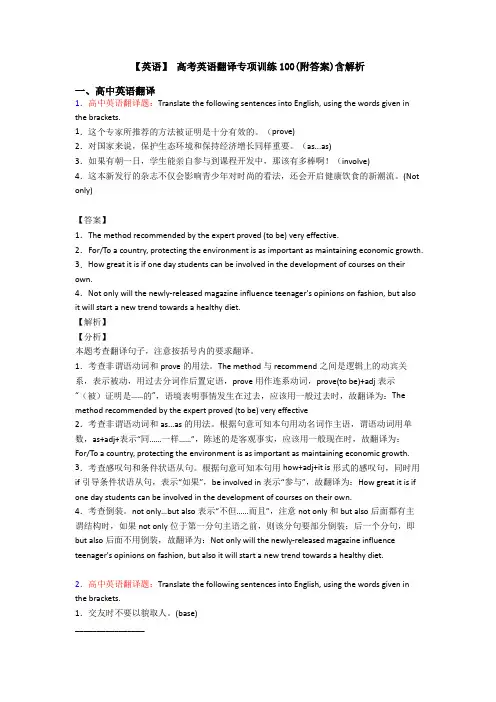
【英语】高考英语翻译专项训练100(附答案)含解析一、高中英语翻译1.高中英语翻译题:Translate the following sentences into English, using the words given in the brackets.1.这个专家所推荐的方法被证明是十分有效的。
(prove)2.对国家来说,保护生态环境和保持经济增长同样重要。
(as...as)3.如果有朝一日,学生能亲自参与到课程开发中,那该有多棒啊!(involve)4.这本新发行的杂志不仅会影响青少年对时尚的看法,还会开启健康饮食的新潮流。
(Not only)【答案】1.The method recommended by the expert proved (to be) very effective.2.For/To a country, protecting the environment is as important as maintaining economic growth. 3.How great it is if one day students can be involved in the development of courses on their own.4.Not only will the newly-released magazine influence teenager's opinions on fashion, but also it will start a new trend towards a healthy diet.【解析】【分析】本题考查翻译句子,注意按括号内的要求翻译。
1.考查非谓语动词和prove的用法。
The method 与recommend之间是逻辑上的动宾关系,表示被动,用过去分词作后置定语,prove用作连系动词,prove(to be)+adj表示“(被)证明是……的”,语境表明事情发生在过去,应该用一般过去时,故翻译为:The method recommended by the expert proved (to be) very effective2.考查非谓语动词和as...as的用法。
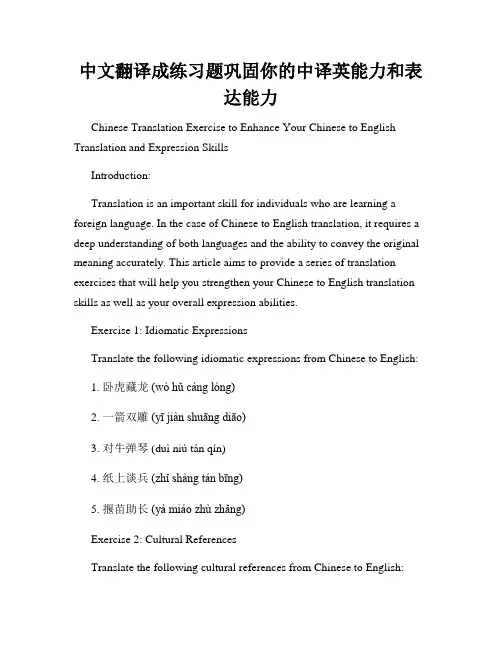
中文翻译成练习题巩固你的中译英能力和表达能力Chinese Translation Exercise to Enhance Your Chinese to English Translation and Expression SkillsIntroduction:Translation is an important skill for individuals who are learning a foreign language. In the case of Chinese to English translation, it requires a deep understanding of both languages and the ability to convey the original meaning accurately. This article aims to provide a series of translation exercises that will help you strengthen your Chinese to English translation skills as well as your overall expression abilities.Exercise 1: Idiomatic ExpressionsTranslate the following idiomatic expressions from Chinese to English:1. 卧虎藏龙(wò hǔ cáng lóng)2. 一箭双雕(yī jiàn shuāng diāo)3. 对牛弹琴 (duì niú tán qín)4. 纸上谈兵(zhǐ shàng tán bīng)5. 揠苗助长(yà miáo zhù zhǎng)Exercise 2: Cultural ReferencesTranslate the following cultural references from Chinese to English:1. 千里之行,始于足下(qiān lǐ zhī xíng, shǐ yú zú xià)2. 按图索骥(àn tú suǒ jì)3. 守株待兔(shǒu zhū dài tù)4. 塞翁失马,焉知非福(sài wēng shī mǎ, yān zhī fēi fú)5. 画龙点睛(huà lóng diǎn jīng)Exercise 3: Sentence TranslationTranslate the following sentences from Chinese to English:1. 实践是检验真理的唯一标准。
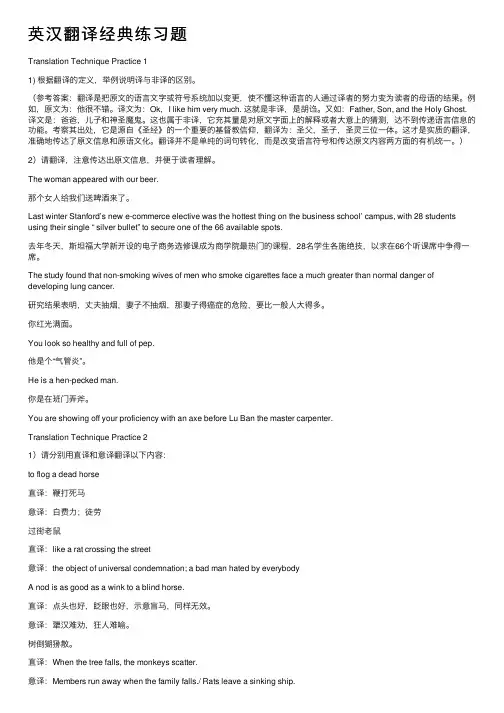
英汉翻译经典练习题Translation Technique Practice 11) 根据翻译的定义,举例说明译与⾮译的区别。
(参考答案:翻译是把原⽂的语⾔⽂字或符号系统加以变更,使不懂这种语⾔的⼈通过译者的努⼒变为读者的母语的结果。
例如,原⽂为:他很不错。
译⽂为:Ok,I like him very much. 这就是⾮译,是胡诌。
⼜如:Father, Son, and the Holy Ghost.译⽂是:爸爸,⼉⼦和神圣魔⿁。
这也属于⾮译,它充其量是对原⽂字⾯上的解释或者⼤意上的猜测,达不到传递语⾔信息的功能。
考察其出处,它是源⾃《圣经》的⼀个重要的基督教信仰,翻译为:圣⽗,圣⼦,圣灵三位⼀体。
这才是实质的翻译,准确地传达了原⽂信息和原语⽂化。
翻译并不是单纯的词句转化,⽽是改变语⾔符号和传达原⽂内容两⽅⾯的有机统⼀。
)2)请翻译,注意传达出原⽂信息,并便于读者理解。
The woman appeared with our beer.那个⼥⼈给我们送啤酒来了。
Last winter Stanford’s new e-commerce elective was the hottest thing on the business school’ campus, with 28 students using their single “ silver bullet” to secure one of the 66 available spots.去年冬天,斯坦福⼤学新开设的电⼦商务选修课成为商学院最热门的课程,28名学⽣各施绝技,以求在66个听课席中争得⼀席。
The study found that non-smoking wives of men who smoke cigarettes face a much greater than normal danger of developing lung cancer.研究结果表明,丈夫抽烟,妻⼦不抽烟,那妻⼦得癌症的危险,要⽐⼀般⼈⼤得多。
高考英语翻译专项训练100(附答案)及解析一、高中英语翻译1.高中英语翻译题:Translation: Translate the following sentences into English, using the words given in the brackets.1.究竟是什么激发小王学习电子工程的积极性?(motivate)2.网上支付方便了客户,但是牺牲了他们的隐私。
(at the cost of)3.让我的父母非常满意的是,从这个公寓的餐厅可以俯视街对面的世纪公园,从起居室也可以。
(so)4.博物馆疏于管理,展品积灰,门厅冷落,急需改善。
(whose)【答案】1.What on earth has motivated Xiao Wang’s enthusiasm/ initiative to major in electronic engineering?2.Online payment brings convenience to consumers at the cost of their privacy.3.To my parents’ satisfaction, the dining room of this apartment overlooks the Century Park opposite the street and so it is with the sitting room.或者What makes my parents really satisfy is that they can see the Century Park from the dining room of this apartment, so can they from the living room.4.This museum is not well managed, whose exhibits are covered with dust, and there are few visitors, so everything is badly in need of improvement.或The museum whose management is reckless, whose exhibits are piled with dust and whose lobby is deserted, requires immediate improvement.【解析】1.motivate sb to do sth 激发某人做某事,on earth究竟,major in 以…为专业,enthusiasm/ initiative热情/积极性,故翻译为What on earth has motivated Xiao Wang’s enthusiasm/ initiative to major in electronic engineering?2.online payment网上支付,brings convenience to给…带来方便,at the cost of以…为代价,privacy隐私,故翻译为Online payment brings convenience to consumers at the cost of their privacy.3.To my parents’ satisfaction令我父母满意的是,后者也那样so it is with。
翻译练习学习将中文句子翻译成英文Translation Practice: Translating Chinese Sentences into EnglishIn today's globalized world, the ability to translate Chinese sentences into English has become increasingly important. Whether it be for academic, professional, or personal purposes, mastering this skill can open up a world of opportunities. In this article, we will explore some strategies and tips for effective translation practice.1. Understanding the ContextBefore diving into the translation process, it is crucial to fully comprehend the context of the Chinese sentences. Context includes both the specific content and the broader cultural nuances. Consider the purpose of the original Chinese text and the intended audience. This step ensures that the translated English sentences accurately convey the original meaning.2. Maintaining the EssenceWhile translating, it is essential to preserve the essence of the Chinese sentences. This means capturing the underlying meaning, tone, and style of the original text. Avoid translating merely word-for-word, as it may lead to awkward and unnatural English sentences. Instead, focus on conveying the intended message fluently in English.3. Adapting Grammar and Sentence StructureChinese and English sentence structures often differ. In Chinese, the subject often comes before the verb, while in English, the subject typically precedes the verb. Additionally, sentence structures in Chinese can be moreflexible, while English follows a more strict pattern. Adapting the grammar and sentence structure accordingly is crucial for producing clear and understandable English translations.4. Choosing Appropriate VocabularySelecting the appropriate vocabulary is crucial for effective translation. Idiomatic expressions and colloquialisms in Chinese may not have a direct equivalent in English. It is important to find suitable English words and phrases that convey the intended meaning. Utilize dictionaries, online resources, and language reference materials to expand your vocabulary for translation purposes.5. Paying Attention to Cultural NuancesCulture plays a significant role in language, and translation should always consider cultural nuances. What may be appropriate in Chinese might not be the same in English-speaking cultures. It is essential to be aware of subtleties and understand cultural connotations to ensure accurate and culturally sensitive translations.6. Iterative Process and ProofreadingTranslation is an iterative process. After completing an initial translation, it is crucial to proofread and refine it. Review the translated sentences for accuracy, coherence, and stylistic consistency. Pay attention to spelling, grammar, and punctuation to ensure the final translation is error-free.7. Practice, Practice, PracticeTranslation, like any skill, requires practice to improve. Engage in regular translation exercises using various types of Chinese texts, such as news articles, literature, or even social media posts. Practice different genres and themes to enhance your versatility in translating Chinese sentences into English.ConclusionDeveloping proficiency in translating Chinese sentences into English is a valuable skill in today's interconnected world. By understanding context, maintaining the essence, adapting grammar and vocabulary, considering cultural nuances, and engaging in regular practice, one can become an adept translator. Embrace the challenges and opportunities that translation presents, as it allows for effective cross-cultural communication and understanding.。
【英语翻译】适用高三Translation总共161句(有中文和译文)A.1. 宁静的乡村生活从来对我没有任何的吸引力。
(Never,appeal)----Never has the quite life of the countrypealed to me. (句型)2. 他很快适应了新的工作环境,并着手开始保护濒危动物的工作。
(adapt)----He soon adapted himself to the new working conditions and set out to protect the animals in danger.3. 他承认他对解决资金短缺问题的关键一无所知。
(admit)----He admitted that he knew nothing about the key to the problem of the shortage of fund.4. 该鼓励学生将课堂上所学的知识运用到实践中去。
(apply)----Students should be encouraged to apply what we have learned in class to practice.5. 几乎人人能享用电脑,这给我们的生活带来了方便。
(access)----Now almost everybody has access to computers, and this brings convenience to our lives.6. 这些广告旨在吸引消费者购买商品。
(appeal)----These advertisements aim at appealing to customers to buy goods.7. 各色阳伞给夏日的街头平添了活泼的气氛。
(add to)----Colourful umbrellas add to a lively atmosphere in the summer streets.8. 他网球比赛输了,因为他不习惯与左撇子打球。
翻译练习题加强你的中英文翻译能力翻译练习题:加强你的中英文翻译能力Introduction:翻译练习是提升中英文翻译能力的有效途径之一。
通过参与练习题,我们可以不断锻炼自己的翻译技巧和语言运用能力,提高准确度和流畅度。
本文将介绍一些翻译练习题,以帮助读者加强他们的中英文翻译能力。
1. 句子翻译练习(Sentence Translation Exercise)这类练习题要求将给定的中文句子翻译成英文。
通过这种练习,我们可以提升翻译的准确度和语言表达的清晰度。
以下是一个例子:中文句子:我喜欢在周末和朋友一起去公园散步。
英文翻译:I enjoy taking walks in the park with my friends on weekends.2. 文章翻译练习(Article Translation Exercise)文章翻译练习要求将整篇中文文章翻译成英文。
这类练习对于培养翻译连贯性和保持原文意义的完整性非常有帮助。
以下是一个例子:中文文章:中国有五千年的历史,是一个拥有丰富文化遗产和悠久传统的国家。
中国人民以勤劳、聪明和勇敢著称。
英文翻译:China, with a history of five thousand years, is a country with rich cultural heritage and long-standing traditions. The Chinese people are known for their hardworking, intelligent, and brave nature.3. 口语翻译练习(Spoken Translation Exercise)口语翻译练习要求将中文对话或演讲翻译成英文。
这类练习可以帮助提高我们的实时翻译能力和口头表达的流利度。
以下是一个例子:中文对话:A: 你去过北京吗?B: 是的,我去年去的。
北京非常美丽。
英文翻译:A: Have you been to Beijing? B: Yes, I went there last year. Beijing is very beautiful.4. 文化翻译练习(Cultural Translation Exercise)文化翻译练习要求将包含文化特色的中文文本翻译成英文,同时传达文化内涵和习俗。